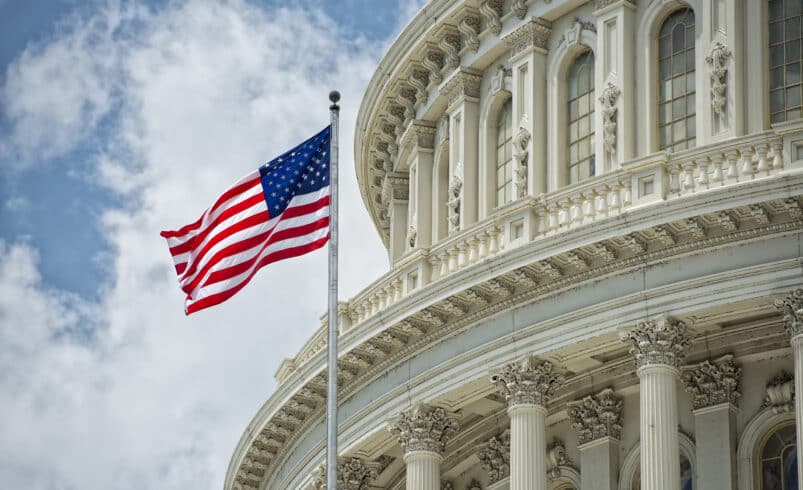Senators Rally to Introduce Bill Against CBDCs Amid Privacy Concerns

Key Insights:
- Senators unite against CBDCs with a bill to prevent Federal Reserve issuance, emphasizing the risk to privacy and freedom.
- Proposed legislation aims to block CBDCs, fearing government surveillance and the erosion of financial privacy for American citizens.
- The coalition of Senators and organizations rally against CBDCs, highlighting potential misuse and calling for Congressional oversight on digital currency.
In a decisive move, a group of United States Senators, led by Rick Scott and Ted Cruz, along with Bill Hagerty, Ted Budd, and Mike Braun, has introduced a bill titled the “CBDC Anti-Surveillance State Act.” This legislative proposal, presented on February 26, seeks to unequivocally prohibit the Federal Reserve from initiating the issuance of Central Bank Digital Currencies (CBDCs) within the United States.
This action comes at a critical juncture in the ongoing discourse surrounding the potential integration of CBDCs into the nation’s financial ecosystem, emphasizing significant concerns regarding privacy, government surveillance, and the broader implications for individual freedoms.
Background and Opposition to Biden’s CBDC Initiative
The bill’s introduction serves as a direct response to an executive order signed by President Joe Biden in 2022, which endorsed the exploration and potential deployment of CBDCs. This executive order underscored the importance of advancing research and development efforts related to CBDCs, with a particular focus on ensuring these initiatives align with the interests and security of the American populace.
Despite the government’s intentions to foster innovation and secure a position at the forefront of digital currency technology, the senators have raised alarms about the potential for such currencies to enable unprecedented levels of surveillance and governmental control over citizens’ financial activities.
Restrictions Envisioned by the Proposed Legislation
The “CBDC Anti-Surveillance State Act” delineates a series of stringent prohibitions aimed at curtailing the Federal Reserve’s ability to issue a CBDC. Notably, the legislation seeks to prevent the Federal Reserve from directly distributing CBDCs to individuals, thereby barring the institution from assuming the role of a retail bank.
Additionally, the act intends to forbid the Federal Reserve from indirectly issuing CBDCs through financial institutions or third-party entities. Beyond these restrictions, the bill articulates a broader objective to ensure that the Federal Reserve does not leverage CBDCs as instruments for executing monetary policy or exerting broader economic influence. This measure underscores the necessity for any CBDC issuance to undergo Congressional approval, guaranteeing a comprehensive evaluation and debate process reflective of democratic principles.
Senatorial Concerns Highlight Privacy and Misuse of Power
The driving force behind the proposed legislation is a profound apprehension regarding the erosion of privacy and the potential for governmental overreach. Senators Cruz and Hagerty, in particular, have voiced concerns about the susceptibility of CBDCs to serve as mechanisms for enhanced surveillance, thereby compromising the financial privacy of American citizens.
Drawing parallels to historical initiatives such as Operation ChokePoint and instances of profiling by the Financial Crime Enforcement Network (FinCEN), the senators argue that the introduction of a CBDC could further embolden governmental entities to manipulate the financial system for political ends.
Endorsements and Political Landscape
The “CBDC Anti-Surveillance State Act” has received backing from a diverse array of organizations, including Heritage Action for America, the Blockchain Association, the American Bankers Association, the Independent Community Bankers Association, and the Club for Growth. These endorsements reflect a shared concern over the implications of CBDCs on privacy, economic freedom, and the integrity of the financial system.
In contrast, figures such as former President Donald Trump have publicly opposed the concept of a CBDC, with Trump expressing his commitment to thwarting its implementation, citing concerns over privacy and freedom.
DISCLAIMER: It's essential to understand that the articles on this site are not meant to serve as, nor should it be construed as, advice in legal, tax, investment, financial, or any other professional context. You should only invest an amount that you are prepared to lose, and it's advisable to consult with an independent financial expert if you're uncertain. To obtain more information, kindly examine the terms of service and the assistance and support resources made available by the issuing or advertising entity. Our website is committed to delivering accurate and unbiased news, yet it's important to note that market conditions may change rapidly. Also, be aware that some (but not all) articles on our site are compensated or sponsored.








